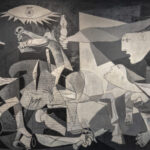Interview: Gatherers shares their history and what’s ahead
Posted: by The Alt Editing Staff

Photo by Kelsey Hunter Ayres
As they work on writing the songs that will become their fourth full-length album, the members of New Jersey rock band Gatherers are broadening their palate. And if their most recent single, April’s “Sick, Sad Heart,” served to whet the appetite, fans had better prepare themselves for a complete change of course.
“We definitely are very conscious that ‘Sick, Sad Heart’ was a departure from what came before,” said vocalist Rich Weinberger. The single was a welcome surprise to fans, suggesting a new album was forthcoming even as the band continued to support 2018’s We Are Alive Beyond Repair. Sure enough, in June, Gatherers confirmed on Twitter they’d begin writing their fourth album this summer.
Not only will the new record signal a tonal shift from We Are Alive Beyond Repair, but even from “Sick, Sad Heart,” which itself pushed into new territory for the fivesome. The introduction of an OP-1 synthesizer, played by guitarist Rob Talalai, gives the song its repetitive, industrial growl. New bassist Zach Crockett’s riff adds to the moody atmosphere. And Weinberger’s howl is somehow both beautiful and ugly, leading to the song’s eventual screaming climax and slow comedown, abruptly ending without a resolution.
“We knew we wanted to have a song with this repetitive, filthy-sounding bass texture a la Nine Inch Nails,” Weinberger said. “And it seems like the trajectory we’re heading in is even further a departure from ‘Sick, Sad Heart.’”
The album is halfway written, and the band will be testing some of the new material at its November shows in Boston and Brooklyn, likely heading into the studio to record this winter. While there’s no definitive timeline for the release, it will be sometime next year.
“We know the title of it already,” Weinberger said. “We’re very excited.”
It will be the third studio album the band has released since founding signer Christian Berrigan stepped away in 2013 and Weinberger came onboard in 2014, with 2015’s Quiet World and We Are Alive Beyond Repair following on the heels of that shift. The current lineup, with Weinberger on vocals, Talalai and Anthony Gesa on guitar, Crockett on bass, and Adam Cichocki manning the drums has only been together since 2019, when Crockett came onboard. Naturally, so many lineup changes, especially at the helm, have lent Gatherers a chameleonic sound. And that won’t change anytime soon.
Even though “Sick, Sad Heart” could be readily categorized as industrial, the new album will navigate different genres, never settling down in one long enough to earn a characterization. And refusing to be pigeonholed is what Gatherers likes best. Taking inspiration on the new record in part from Radiohead’s “Climbing Up The Walls” off 1997’s OK Computer and post-hardcore mainstays Thursday’s 2001 album Full Collapse, the band is figuring out their place in today’s music landscape—one in which rock is often treated like a four-letter word. (In a bizarre recent New York Times interview, Mike Kaplan, the program director of New York’s ALT 92.3 alternative radio and format captain for alternative across Entercom, said, “We don’t even say the word ‘rock’ on the radio station. I don’t think there’s a big win in using the word rock today.”)
Gatherers is part of the Equal Vision Records roster, which supports bands in the hardcore, post-hardcore, alternative, and experimental spaces, many of whom are also continuing to redefine how we think of genres (or don’t) in 2019.
“Once upon a time those labels were helpful, but now, given the current climate, there’s so much great music coming out now at such a rapid pace,” Weinberger said. “Wanting to contextualize or label music is fruitless, and it’s a tedious conversation to have with people. I don’t think it accomplishes much other than help you navigate a record store to find it.
“People do make premature judgments based on [labels], though,” he adds. “It is challenging for Gatherers.”
Any prospective Gatherers fan in 2019 is coming to the band, and to music listening in general, imprinted by all the bands they grew up listening to. Nostalgia is hanging heavy in the air in 2019, where bands ranging from Glassjaw to Taking Back Sunday to Built to Spill to Bloc Party to Avail are celebrating 15th or 20th anniversaries with sets playing through their respective albums in their entirety.
“We’re hitting the 20-year mile marker, and we’re at the age they were when we were kids worshipping at the altar of those bands,” says Weinberger. Post-hardcore fans today, whether they’re twenty or fifty, are quick to turn back to an album from two decades ago that feels like home. All of this begs the question for a band making new music in 2019: how do you nod to the influences you and your fans grew up on while carving out a definitive space for yourself in the scene? “
Even for the members of Gatherers themselves, says Weinberger, you could draw a Venn diagram of musical influences and it would hardly intersect. Weinberger and Gesa, who grew up on Long Island, were raised on early 2000s hardcore bands like Taken and Thursday; “Glassjaw was the fuckin’ bible for me,” Weinberger says. But also, growing up, Weinberger’s uncle would give him hand-me-down CDs ranging from The Offspring to Talking Heads to Deftones. Opposite Gesa, Talalai brings an indie sensibility to the guitar section, inspired heavily by Interpol.
“At its core any band inevitably is going to bear some resemblances to the bands that have inspired them,” Weinberger said. “With some bands it’s very obvious what they’re inspired by, with other bands you have to dig a little deeper.”
Like two bands they admire, Nine Inch Nails and Radiohead, the force that propels Gatherers is an unsatiated urge to dig deeper, transform their sound, and, above all, “write songs that first and foremost we personally would love to listen to.”
The hope is that every album is “a different color, a different flavor;” the aim is to avoid a homogenous discography. Gatherers strives to be an album band—rather than write two singles and package them with 10 mediocre songs, the band wants to “create something of an experience for 40 minutes.”
When he’s writing, Weinberger finds inspiration through visual arts. When the band started working on the new album, Midsommar had just come out. “We’re all very head over heels for it,” Weinberger said. “It’s definitely a mood.”
Weinberger has been obsessed lately with watching Heaven’s Gate videos, the suicide cult from the ’90s. That’s the backdrop against which the band has been creating new material. Weinberger’s lyrics have always been abstract, and he’s pushing even further in that direction. “A lot of my favorite lyricists tend to be the ones where you can’t find a consensus on what it actually means, and they don’t go on record or go out of their way to try and explain it,” he said.
Even though this lineup doesn’t go way back, their writing process is well-oiled. “We nonverbally all understand the headspace,” Weinberger said. “We talk about the album title. We have our eyes set on a piece of artwork we’d like to be able to commission for the album cover.” As they work, they ask themselves, “What’s the color? What’s the headspace?”
“Once we have a record done we can take a step back and say “What have we done here?” and maybe draw our own personal conclusions about it,” Weinberger said. One thing the band knows it doesn’t want is a comfortable set of shoes to walk in album after album. In striving to make something they themselves would want to listen to, Weinberger said, Gatherers knows this album will be divisively received. But it doesn’t matter to them, as long as they continue pushing forward and growing. Few bands do it gracefully. But Gatherers doesn’t mind that growth is sometimes messy.
–
Michelle Bruton | @michellebruton
The Alternative is ad-free and 100% supported by our readers. If you’d like to help us produce more content and promote more great new music, please consider donating to our Patreon page, which also allows you to receive sweet perks like free albums and The Alternative merch.










